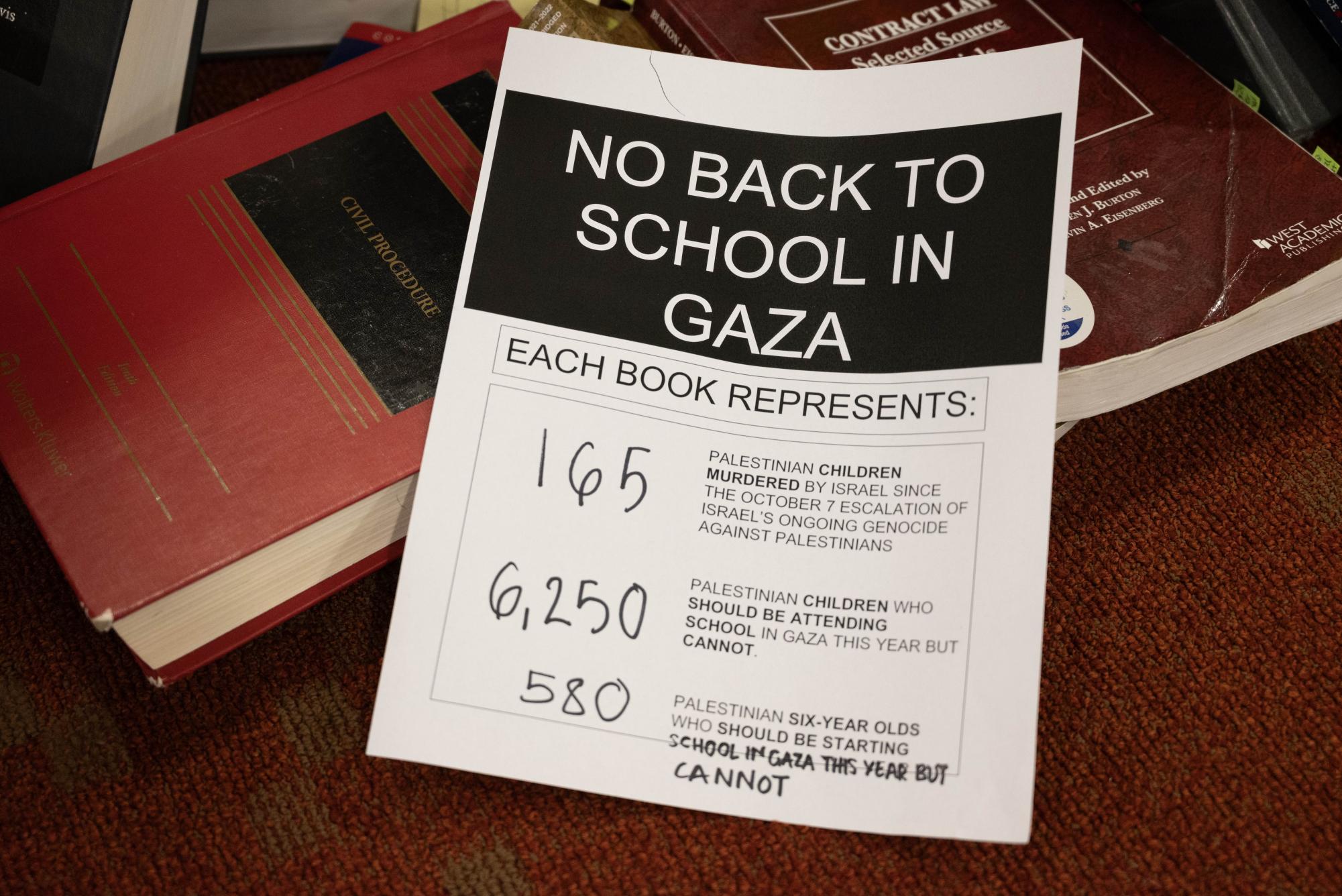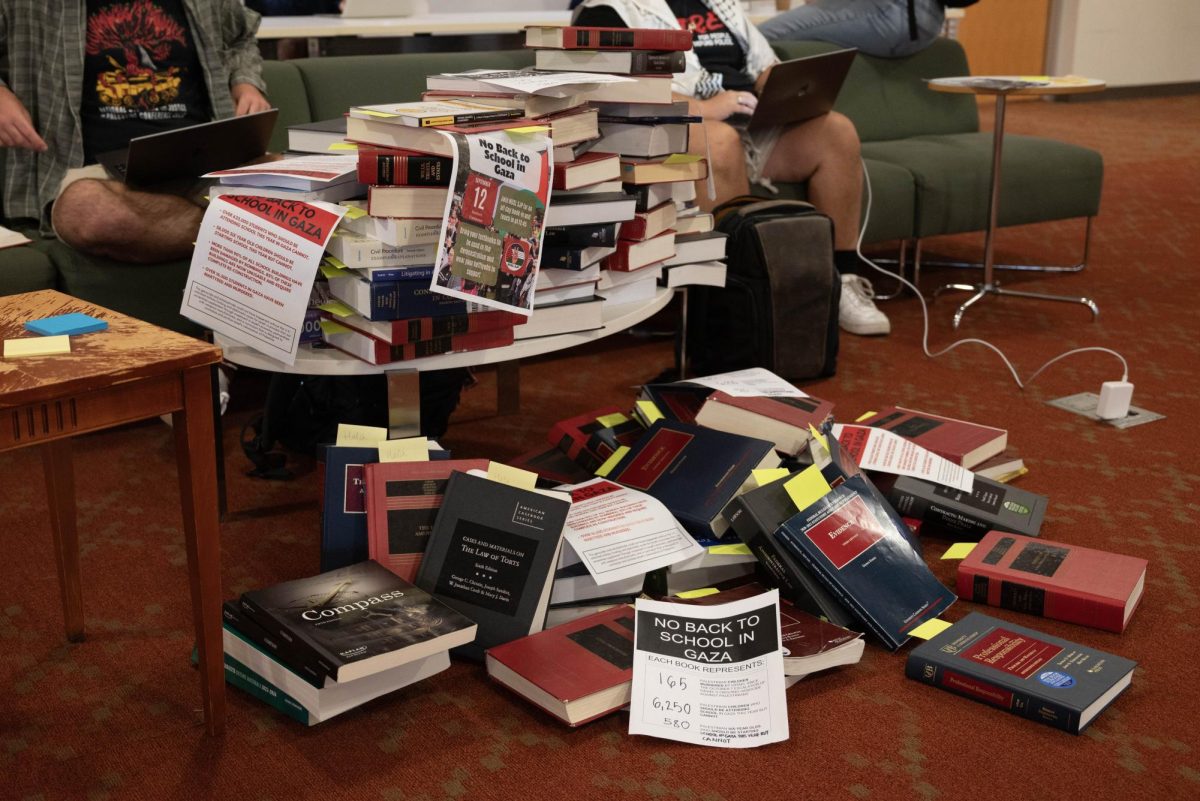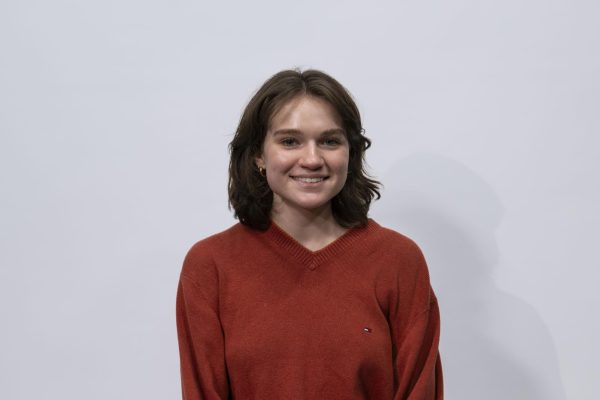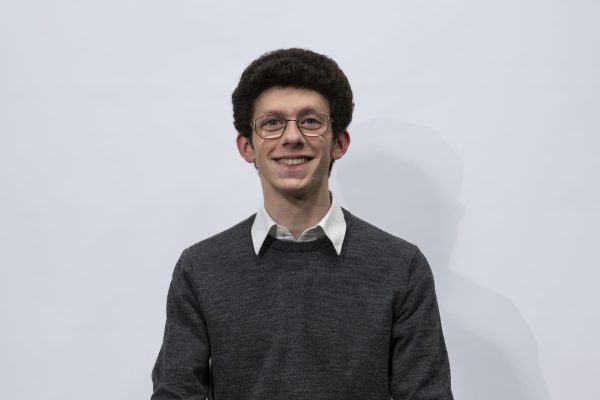Dozens of textbooks sat abandoned in the middle of Dockser Commons Sept. 12 in a demonstration against what protesters called an ongoing “scholasticide” and “genocide” in Gaza, marking the first major pro-Palestine protest on the Boston campus since nearly 100 students were arrested at a pro-Palestine encampment on Cenntenial Common in April.
The demonstration, called a “book-in” and organized by Northeastern University School of Law Students for Justice in Palestine, or NUSLSJP, called attention to the estimated 650,000 children in Gaza who are unable to attend school this year due to Israel’s ongoing military operations in the region, according to reporting by The Washington Post.
“There is no back to school in Gaza,” said Samira, a first-year School of Law student who asked for her last name to remain anonymous due to fear of retaliation for protesting the university’s administration. “Violence against Palestinians has only increased substantially — against men, women, children — and our school is normalizing that and normalizing relationships with companies and organizations that are complicit and actively part of that.”
Since the outbreak of the Israel-Hamas war in October 2023, which began when Hamas killed 1,200 people and took 250 hostages in Israel Oct. 7, pro-Palestine student groups at Northeastern have held numerous protests against the university’s investments in companies that supply weapons for Israel’s counteroffensive. Pro-Palestine students have called the war, which has claimed the lives of over 40,000 Palestinians, a genocide.
On Sept. 12, NUSLSJP asked students to drop off their textbooks for the day in Dockser in an effort to continue pressuring the school to cut ties with companies that do business with Israel. The event also included a “teach-in” around midday that discussed “Zionist ties at Northeastern and Boston and how you can engage in [the Boycott, Divest and Sanction movement] to weaken ‘israel’ [sic],” according to a NUSLSJP Instagram post.
“We are answering a national call to action to draw attention to the fact that while we are all back to school here in the fall, there are thousands of thousands of children in Gaza that do not have the opportunity to go back to school because of the scholasticide, aka, the destruction of all the universities in Gaza, and the fact that there is an ongoing genocide that is targeting so many children in Gaza currently,” said Hala, a third-year School of Law student who asked for her last name to remain anonymous due to fear of retaliation for protesting the university’s administration. “They are deprived not only of education, but they are also having to survive under a genocide.”
According to the United Nations, “scholasticide” refers to the “systemic obliteration of education through the arrest, detention or killing of teachers, students and staff, and the destruction of educational infrastructure.” A July report by Education Cluster found that close to 93% of the 564 school buildings in Gaza have sustained some level of damage since October, 344 of which have been directly hit.
Special Procedures experts at the United Nations said in April it “may be reasonable to ask if there is an intentional effort to comprehensively destroy the Palestinian education system.”
“We, as students, have a responsibility to say something about it and to stop it,” Samira said. “I think people feel disenchanted about where they can focus their energy, and we want them to know that we’re still here and there’s still a place for them to take action. We know people are frustrated, and we know they want things to change.”
Most of the books piled on a table in the middle of the first floor of Dockser were law textbooks, with titles like “Professional Responsibility” and “Evidence” placed at the front. Flyers were dispersed among the books, with one reading that each book represented 165 Palestinian children “murdered by Israel,” 6,250 Palestinian children who cannot attend school and 580 Palestinian 6 year olds who “should be starting school in Gaza this year but cannot.”

“Having this many people show up and having this many books donated is a somewhat beautiful display of Northeastern students and their commitment to Palestine,” said Nick, a third-year School of Law student who asked for his last name to remain anonymous due to fear of retaliation for protesting the university’s administration. “At the same time, this number of books doesn’t nearly represent the number of people that have been murdered, displaced and aren’t able to return to school.”
“We are so privileged to be able to come back this semester. And as we go to class and as we walk around these halls, we can feel secure in our ability to be here,” Nick said. “And there are kids in Gaza and there are university students in Gaza who do not have the opportunity to come [to school].”
Though the summer remained relatively quiet for pro-Palestine protests on campus, NUSLSJP, along with Northeastern University Students for Justice in Palestine, filed a civil rights complaint against the university with the U.S. Department of Education in August. More than a dozen students with the respective groups urged the department to launch an investigation into Northeastern’s alleged discrimination against Palestinian and Palestinian-supporting students.
“A lot of us took the summer to regroup and reorganize, and NUSLSJP was very actively involved in drafting that complaint letter,” Hala said. “We have always been actively working and organizing, even if it’s not apparent to everyone.”
Organizers of the book-in said the demonstration was only the first of the semester in the ongoing fight to get Northeastern to divest.
“I want the school to know that we are back and that we have not forgotten the cause that we have been fighting for the past year,” Hala said. “We are going to continue to push the university toward divestment until we get divestment.”
The Huntington News is dedicated to serving the Northeastern University community with original, professional reporting and creating an environment in which student journalists can learn from one another. Support an independent, free press at Northeastern University with your donation today.












